English
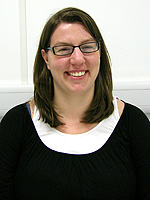
Anna Rice

It has been over a year since the collaboration between the Barbican/Guildhall School Creative Learning started. I had an interview with Anne Rice, who mainly works on music education projects and is the Music and Cross Arts Producer of Creative Learning. (The interview took place in January 2011)
Anna Rice Interview
The Barbican/Guildhall School Creative Learning Department
Interview: Anne Rice (Music and Cross Arts Producer, Creative Learning)
*The interview took place in January 2011
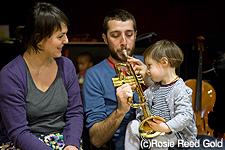
'Barbican/Guildhall School Creative Learning has existed for just over a year, so we are still exploring how it will work better. As you know, the Guildhall School primarily teaches music, and has fantastic staff and experience in the theatre field. The Barbican has worked on all art forms, including music, cinema, dance, visual arts, literature, and so on. Across the Barbican and Guildhall, we cover education programmes in all art genres, including cross-arts projects. The former 'Barbican Education' and 'Guildhall Connect' have worked separately for each educational programme for a long time, but now everyone in this team works for both, under the leadership of the Director, Sean Gregory.'
'Through working with other organizations, you learn a lot from their different expertise and experience. If you are working alone, you have to start from scratch in everything. It takes a lot of time, effort and experience to reach a quality of programme as high as other expert organizations already have.
You can also reach a wider range of people. Especially, working with the local authorities really helps us to know where we can find a match in the local community, and how to approach them. We cannot keep track of up to date information about the local community by ourselves.
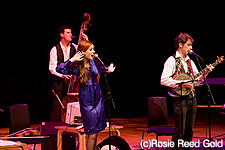
Working with the LSO and the Guildhall School gives us great merit from having a fantastic level of artists and teachers. Both of them are not only a top-quality orchestra or conservatoire, but also have more than 20 years of rich experience of educational and community work. In addition, we share information about which artists come, so instead of letting the artist give just some performances or lectures and go back again, we can utilize them by devising educational programmes that fit the artists.
I am also excited about thinking how the Barbican can offer a unique opportunity for students at the Guildhall. Through getting involved with our team over the course of the year, they get to perform in different environments, such as Barbican Hall, free stages, open spaces, galleries, the theatre pit at the Barbican Centre, and other different venues outside the Barbican. They also have a fantastic opportunity to work with professional artists of different art genres with whom we collaborate, in our creative programmes. It is a treasure that they have these experiences while they are still students. It makes me think that I want to be a student again!
Besides the Guildhall School, we also work with students and teachers for other high level art institutions, including the Royal College of Art and the London College of Fashion. As for artists, we collaborate with musicians, visual artists, fashion designers, architects, photographers, dancers, actors, sound designers, theatre technicians, film makers, and artists whom we cannot define to which genre they belong. We are always exploring whom we can work with.
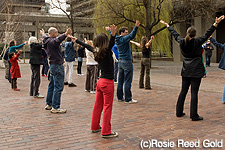
'It is not something that we can clearly define what kind it is, but as for music for example, we have programmes as follows: concerts, masterclasses, pre-concert talks, seminars, introductory music workshops, school concerts, school workshops, creative workshops with musicians and artists from other genres, classic ensembles and orchestras, rock bands, jazz bands, research, festivals, open rehearsals, composition workshops, free stage performances, teacher training, resource packs for teachers, skill-up course, training for future professionals, programmes for the artists themselves, and so on. It depends on whom you work with and where. In Creative Learning, we are not working by the type of event, but by art genre: Music, Theatre, Cinema, Arts. I work on all of the projects related to music, whether it is a stage performance or a school workshop'.
'Schools play the major part. We go to about 100 schools a year across all art genres. We also go to hospitals, facilities for the elderly or people with special needs, prisons, festivals and so on. We customise our programmes according to their needs, and our main focus is to build sustainable relationships with or neighbouring East London boroughs and the way we aim to work in partnership to enable our work to be sustainable.'
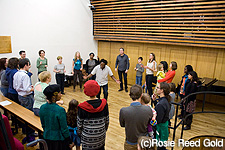
'No. We do not particularly like going to schools with a ready-made project and saying, 'This is what we have, you must take it'. What we are trying to do is to talk with them about what they need for their audience in schools, families and communities, and then devise the programme for them.'
'Yes. When we go to schools, we discuss it with the teachers, because they are the experts in the field. They know what their students need and what is effective for them, more than anybody. Then we think of what we can offer through our artists. The length of the projects depends on each school. There are one-off sessions, week-long projects, weekly sessions over one term, and some stretch over a year. Whether the schools pay a fee also depends on their financial situation. When the project requires a fee that they cannot afford, we need to fundraise for that. Creative Learning receives some money from the City of London Corporation, but we need to fundraise by applying for trusts and foundations for each project as well. So every project needs at least six months for designing and fundraising.'
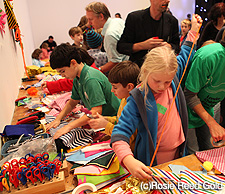
'There was a big movement in the 1980s in the UK, when art organizations realized that they could not just exist for performance, and they needed to work with the community. Some organizations responded quickly, but it took some organization a while to catch up. Now, I cannot think of any art organization that does not have an educational programme, and nearly all conservatoires in the UK train their musicians to work in the community as well as to perform the best on the stage.
The London Sinfonietta was probably the first orchestra to have its own education department. I used to work there as education manager. Its first artistic director, Gillian Moore, also served as a consultant for the government to discuss introducing music into the National Curriculum. For the last 30 years, music education has been respected compared to other art genres, and the importance of what music can bring to all lives and the idea that music is a fundamental part of the education have been widely recognized by the government and the people in the UK.'
'Personally, I think "access" is the main key to the projects. I want everyone to feel that they have an opportunity, and that they can participate in art. Once they have engaged with it, they can form their decision, and they can choose what they would like to do. I think it is a shame when people decide that music is not for them before they have a chance to know what it is.
We are not necessarily encouraging anyone to play a musical instrument, or to be a dancer. If they do not want to play an instrument afterwards, it is fine, because they have had the opportunity. Besides, the arts can still be an important part of their lives if you do not become a dancer or a musician.
There is an idea of "softer objectives" in the UK, that you can measure the ability or improvement of a child at the age of 7 to 10, by, for example, when they learn to play a violin, not only measuring their technical improvement in performance, but also by looking at the different experience of music that they have; that they have realized the opportunity and their ability which they did not have before, their self-esteem and confidence might have been improved, they might have been inspired by an artist's performance or what they said, and so on.
In that sense, whether they are children or adults, future professionals or complete beginners, artists or arts practitioners, anyone can learn from art experience. Whatever I do for Creative Learning, I try to ensure that as many people have access to the experience as possible, by looking at it from different angles.'
Report: Chigusa Futako








